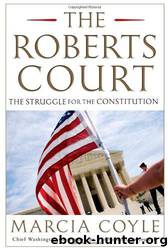The Roberts Court by Marcia Coyle

Author:Marcia Coyle
Language: eng
Format: mobi
Tags: (¯`'•.¸//(*_*)\\¸.•'´¯)
ISBN: 9781451627510
Publisher: Simon & Schuster
Published: 2013-05-07T00:00:00+00:00
CHAPTER 11
“The greatest living issue confronting us today is whether the corporations shall control the people or the people shall control the corporations.”
—Montana newspaper, 1906
The opening of the October 2008–09 Supreme Court term offered little hint of the drama that would mark the term’s ending.
By the time Citizens United had filed its challenge in August 2008, a new crop of law clerks was already deep into preparations with their justices for the first week of arguments and into some of the traditions that lighten their workloads. One very old tradition was the clerks’ weekly Happy Hours.
The responsibility for organizing the Happy Hours rotated among the chambers and some justices would occasionally participate. The planning ranged from fairly simple to elaborate. The Summer Olympics had ended shortly before the term’s opening and some of the Happy Hours featured improvised Olympic Games. Later in the term, the clerks would hold a New England–style clambake in honor of the justice from New Hampshire—David Souter, whose retirement would contribute to the drama toward the end of the term.
But the term itself appeared to be something of a snooze at the beginning. There were no cases with the potential blockbuster status of the prior term’s Second Amendment gun ruling or the Guantánamo Bay detainees’ challenge.
Appearances can be deceiving, however, especially at the Supreme Court.
“There are several species of tough and important cases at the Court,” said a former clerk from that term. “The high-profile cases—they often are huge when decided, but then they go away. There also are those institutional cases that really might not be high profile immediately, but they have a deeper and wider impact on the [legal] system and their presence is felt more significantly at the Court because they live on.”
Two cases fell into that latter category during the 2008–09 term: Melendez-Diaz v. Massachusetts, and Ashcroft v. Iqbal. In Melendez-Diaz, justices crossed the ideological divide to reach the ruling; but in Ashcroft, the outcome reflected the traditional ideological divide among them.
The Melendez-Diaz case involved the Sixth Amendment’s confrontation clause, which guarantees the right of an accused to confront—to cross-examine—the witnesses against him. Luis Melendez-Diaz challenged his drug conviction on grounds that the prosecution violated his confrontation clause right by admitting laboratory test reports without allowing him to cross-examine the analysts who prepared the reports.
This case followed the Court’s confrontation clause revolution begun in 2004 with a Scalia-authored opinion in Crawford v. Washington. Looking to history and the clause’s “original meaning,” Scalia in Crawford said that “the Framers would not have allowed admission of testimonial statements of a witness who did not appear at trial unless he was unavailable to testify, and the defendant had had a prior opportunity for cross-examination.”
The Crawford decision in 2004 was unanimous, but the Court has split 5–4 several times since then over what is “testimonial,” and the justices’ alignments have been unusual. Scalia is usually joined by Thomas and their more liberal colleagues, Ginsburg and until their retirements, Stevens and Souter. And Kennedy regularly leads the dissenters, joined by conservatives Roberts and Alito and the liberal Breyer.
Download
This site does not store any files on its server. We only index and link to content provided by other sites. Please contact the content providers to delete copyright contents if any and email us, we'll remove relevant links or contents immediately.
Objection! by Nancy Grace(1778)
Apeirogon by Colum McCann(1698)
Anatomy of Injustice by Raymond Bonner(1656)
That Every Man Be Armed by Stephen P. Halbrook(1576)
Civil Procedure (Aspen Casebooks) by Stephen C. Yeazell(1540)
The Vaccine Court by Rohde Wayne(1504)
Injustices by Ian Millhiser(1497)
Storytelling for Lawyers by Meyer Philip(1457)
A Practical Guide to International Arbitration in London by Hilary Heilbron(1424)
Restitution by Restitution(1424)
Coercing Virtue by Robert H. Bork(1355)
Broken Scales by Joel Cohen(1348)
Tangled Webs: How False Statements Are Undermining America: From Martha Stewart to Bernie Madoff by James B. Stewart(1329)
A Matter of Interpretation by Antonin Scalia(1305)
The Tools of Argument: How the Best Lawyers Think, Argue, and Win by Joel Trachtman(1302)
INDEFENSIBLE: One Lawyer's Journey Into the Inferno of American Justice by Feige David(1278)
American Tragedy by Lawrence Schiller & James Willwerth(1267)
Tangled Webs by James B. Stewart(1245)
A Religious Orgy in Tennessee by H.L. Mencken(1243)
